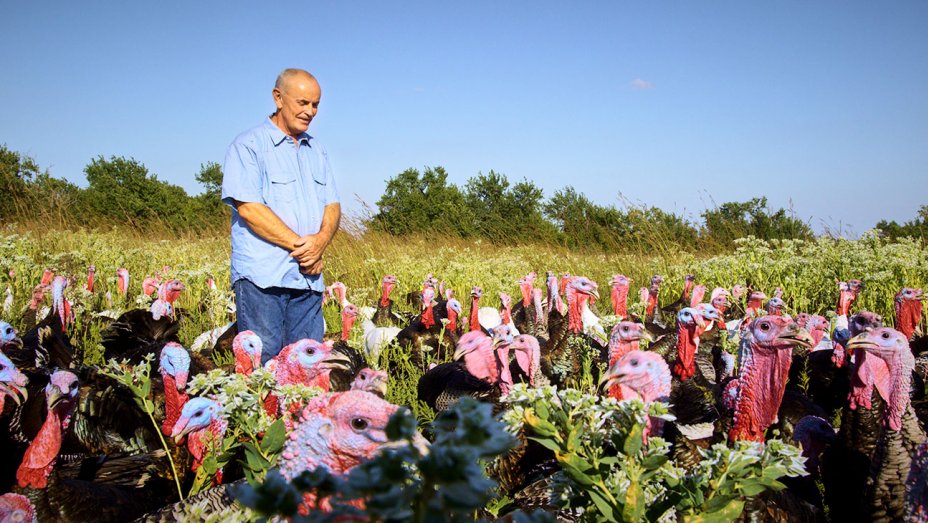EATING ANIMALS
IFC Films
Reviewed by: Harvey Karten
Director: Christopher Quinn
Screenwriters: Christopher Quinn, Jonathan Safran Foer, adapted from Jonathan Safran Foer’s book “Eating Animals”
Cast: Natalie Portman narrates the story of a team of farmers heartbroken for the loss of their way of life
Screened at: Critics’ link, NYC, 5/24/18
Opens: June 15, 2018
America zigs and zags politically from left to right but on the whole, the U.S. has been moving in a progressive direction. Here’s how:
1865 – Enslaved people freed.
1869 – Former slaves and people of color freed to vote
1919 – Women freed to vote
1933 – Liquor free to be consumed
1954 – People of color free to attend school with whites
1971 – 18-year-olds free to vote
1973 – Women freed to end pregnancy within limits
2028 – Animals freed. Current animal stock may be slaughtered but beginning Jan. 1, no animal may be bred for food.
You’re probably wondering about the last item. Yeah, that’s fake news, but we PETA members can dream, can’t we? There are many reasons that food animals, heretofore tortured by oppressive conditioned and killed long before their predicted life cycle has been completed, should end. Adapted from Jonathan Safran Foer’s 368-page non-fiction book published in 2010, the book opens as the author recounts memories of his grandmother who believed that “everything is good for you…even sugar. Coca-Cola is fine and plump is healthy.” Film-wise, only small segments of “Eating Animals” deals with our nutrition needs. The real evil shown here is the power of factory farms where 99% of our food animals come from. You may drive through the rural parts of your state and see numbers of contented cows eating grass and taking in the sun, but remember that factory farms can each hold millions of chickens and thousands of cows and pigs, wholly overwhelming your illusion of how your steak or ham was treated before it became edible.
As narrated by Natalie Portman, herself a vegetarian since the age of 8 who morphed in 2007 into a vegan, and adapted from Jonathan Safran Foer’s book by a writer who became wholly aware of the evils of meat production, “Eating Animals” says nothing about the condition of the workers in the slaughterhouses, folks who may shuttle back and forth from the U.S. to Mexico. That job was covered by muckraker Upton Sinclair, a social and unsuccessful candidate for governor in “The Jungle” published in 1906.
If you’re looking for a Michael Moore style doc or a sequel to Morgan Spurlock’s “Super Size Me” and “Fast Food Nation,” know that humor is absent in this doc, which makes it immediately a pass by people who see it advertised. If you think that if the American people should see slaughterhouses in operation they would all become vegetarian, as Isaac Bashevis Singer opined, you’re probably wrong there too. Frederick Wiseman, a major documentarian who made the film “Meat” about conditions in slaughterhouses, enjoyed a steak every night during the filming. So what does “Eating Animals” do to turn us off the habit of meat-eating? The picture does point out huge lagoons of cesspools made of up animal poop and urine. It does show us how animals are injected and fed with antibiotics to make them grow four times larger than they otherwise would. And it does make us sympathize with small farm owners who can no longer make a go, to compete with Purdue and the like. It even mentions that the antibiotics fed to animals can wind up in our stomachs leaving us ill, as in 1918 when a flu epidemic killed 25 million people.
But what it fails to note is that the daily diet of animal flesh can lead to heart attacks, strokes, and similar problems, but even though most of us know this, just as we know that one half of cigarette smokers will die of tobacco-related disease, we will continue to do what gives us immediate pleasure. Whistleblowers are glorified, but what have they achieved? Thirty states now have ag-gag laws that make it a felony for people to photograph what goes on in and around slaughterhouses. Follow the money. Political contributions will almost always drown out the voices of the moralists.
Above all, we are prompted to sympathize with the plight of small independent farmers. That in itself should lead us to shed a tear for a way of life that’s gone. But tomorrow, our eyes will be dry.
Unrated. 95 minutes. © 2018 by Harvey Karten, Member, New York Film Critics Online
Story – B+
Acting – B
Technical – B
Overall – B






